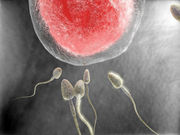Presence of a non-Lactobacillus-dominated microbiota linked to poor reproductive outcomes
THURSDAY, Dec. 15, 2016 (HealthDay News) — The presence of a non-Lactobacillus-dominated microbiota in a receptive endometrium is associated with poor reproductive outcomes for women undergoing in vitro fertilization (IVF), according to a study published in the December issue of the American Journal of Obstetrics & Gynecology.
Inmaculada Moreno, Ph.D., from Igenomix SL in Valencia, Spain, and colleagues examined the existence of an endometrial microbiota that differs from that in the vagina and examined its impact on reproductive outcome in infertile patients undergoing IVF. The hormonal regulation of the endometrial microbiota was investigated and the reproductive impact of an altered endometrial microbiota in endometrial fluid was assessed in infertile patients undergoing IVF.
The researchers found that paired endometrial fluid and vaginal aspirate samples showed that there were different bacterial communities between the uterine cavity and the vagina of some subjects. The microbiota in the endometrial fluid was defined as a Lactobacillus-dominated microbiota or a non-Lactobacillus-dominated microbiota. The presence of a non-Lactobacillus-dominated microbiota was not hormonally regulated during acquisition of endometrial receptivity, but in a receptive endometrium it was associated with significant decreases in the rates of implantation, pregnancy, ongoing pregnancy, and live birth.
“Our results demonstrate the existence of an endometrial microbiota that is highly stable during the acquisition of endometrial receptivity,” the authors write. “However, pathological modification of its profile is associated with poor reproductive outcomes for in vitro fertilization patients.”
Several authors are employees of Igenomix SL and Lifesequencing SL, both of which funded the study.
Full Text
Copyright © 2016 HealthDay. All rights reserved.








